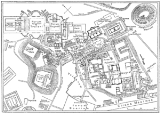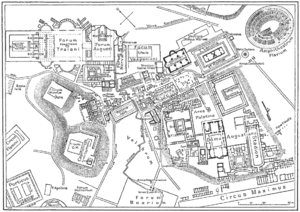
Stadion
Encyclopedia

Panhellenic Games
Panhellenic Games is the collective term for four separate sports festivals held in ancient Greece. The four Games were:-Description:The Games took place in a four-year cycle known as the Olympiad, which was one of the ways the Greeks measured time...
. It was one of the five major Pentathlon
Ancient Olympic pentathlon
The Ancient Olympic pentathlon was an athletic contest at the Ancient Olympic Games, and other Panhellenic Games of Ancient Greece. The name derives from Greek, combining the words pende and -athlon...
events. It was the premier event of the gymnikos agon (nude competitions) (Miller, 31). From the years 776 to 724 BC, the stadion was the only event that took place at the Olympic Games and the victor gave his name to the entire four-year Olympiad (Miller, 31). This allows scholars to know the names of nearly every ancient Olympic Stadion winner (Miller, 31) Running in Ancient Greece
Running in Ancient Greece
The history of Greek running goes back to 776 BC. Running was important to members of ancient Greek society, and is consistently highlighted in documents referencing the Olympic Games. The Olympic Games hosted a large variety of running events, each with their own set of rules. The ancient Greeks...
The stadion was named after the building in which it took place, also called the stadion. This word became stadium in Latin
Latin
Latin is an Italic language originally spoken in Latium and Ancient Rome. It, along with most European languages, is a descendant of the ancient Proto-Indo-European language. Although it is considered a dead language, a number of scholars and members of the Christian clergy speak it fluently, and...
, which became the English
English language
English is a West Germanic language that arose in the Anglo-Saxon kingdoms of England and spread into what was to become south-east Scotland under the influence of the Anglian medieval kingdom of Northumbria...
word stadium
Stadium
A modern stadium is a place or venue for outdoor sports, concerts, or other events and consists of a field or stage either partly or completely surrounded by a structure designed to allow spectators to stand or sit and view the event.)Pausanias noted that for about half a century the only event...
. There were other types of running events, but the stadion was the most prestigious; the winner was often considered to be the winner of an entire Games. Though a separate event, the stadion was also part of the ancient Pentathlon
Pentathlon
A pentathlon is a contest featuring five different events. The name is derived from Greek: combining the words pente and -athlon . The first pentathlon was documented in Ancient Greece and was part of the Ancient Olympic Games...
.
At the Olympic Games, the Stadion (the actual building) was big enough for twenty competitors, and the race was a 200-yard (about 180-meter) sprint. The original stadion track in Olympia
Olympia, Greece
Olympia , a sanctuary of ancient Greece in Elis, is known for having been the site of the Olympic Games in classical times, comparable in importance to the Pythian Games held in Delphi. Both games were held every Olympiad , the Olympic Games dating back possibly further than 776 BC...
measures approximately 190 meters. The race began with a trumpet blow, with officials (the agonothetai - ἀγωνοθέται) at the starting blocks to make sure there were no false starts. There were also officials at the end to decide on a winner and to make sure no one had cheated (if the officials decided there was a tie, the race would be re-run). Runners started the race from a standing position, probably with their arms stretched out in front of them, instead of starting in a crouch like modern runners. They ran naked on a packed earth track. By the fifth century, the track was marked by a stone-starting line known as the balbis. Advancements in this stone starting block led to it having a set of double grooves (10–12 cm apart) in which the runner placed his toes. The design of these grooves were intended to give the runner leverage for his start (Miller, 35).
The winner of the stadion in the first Olympic Games was Coroebus of Elis
Coroebus of Elis
Coroebus of Elis was a humble Elean baker and athlete who won the stadion race in the first recorded Ancient Olympic Games in 776 BC.-Olympics:...
.
The race gave its name to the unit of length; see Stadia.

